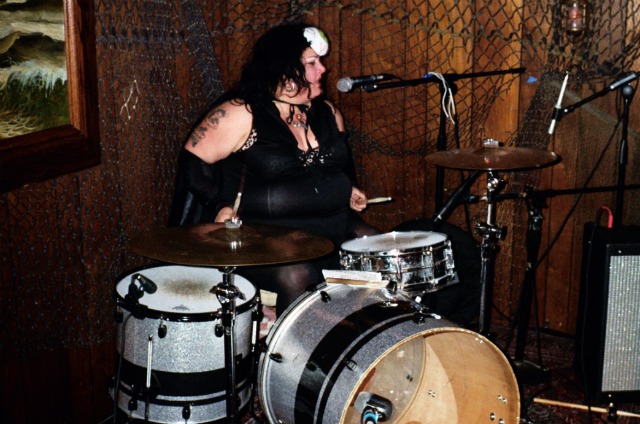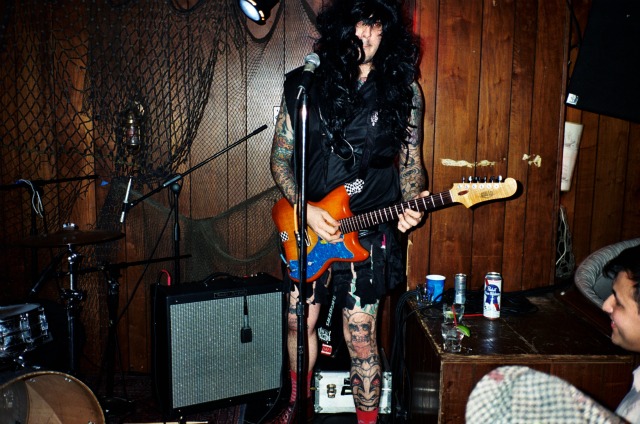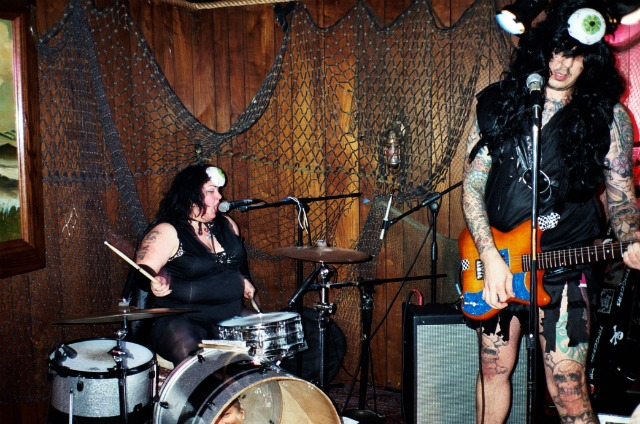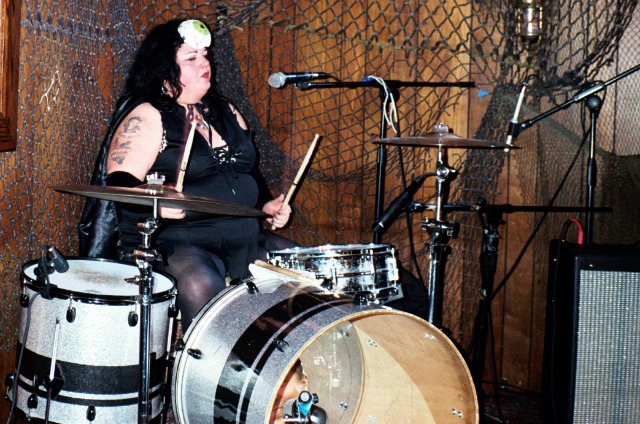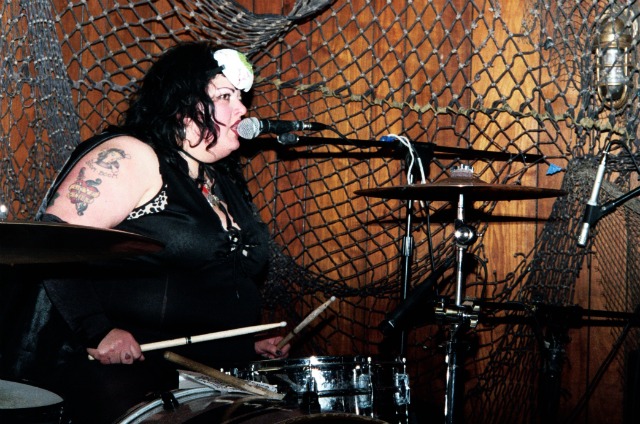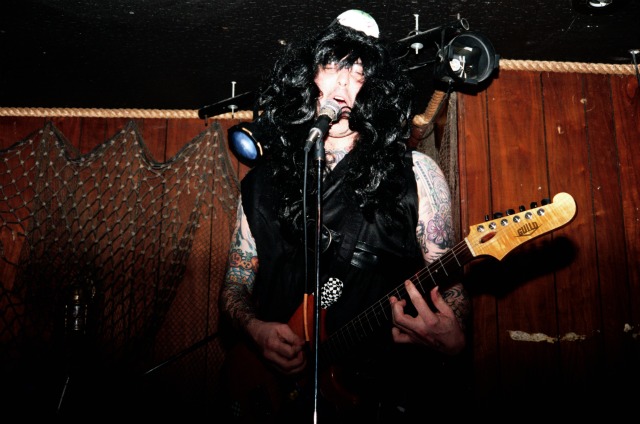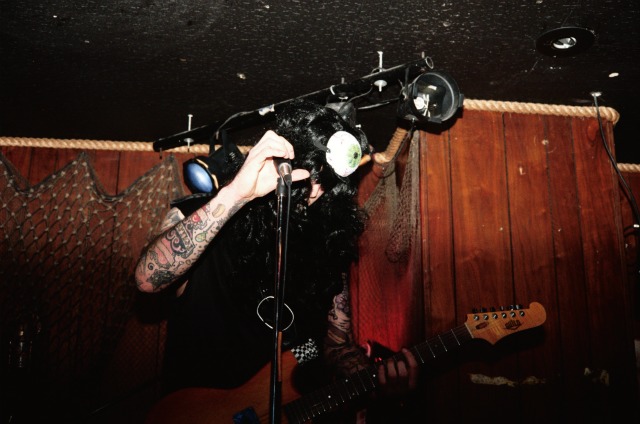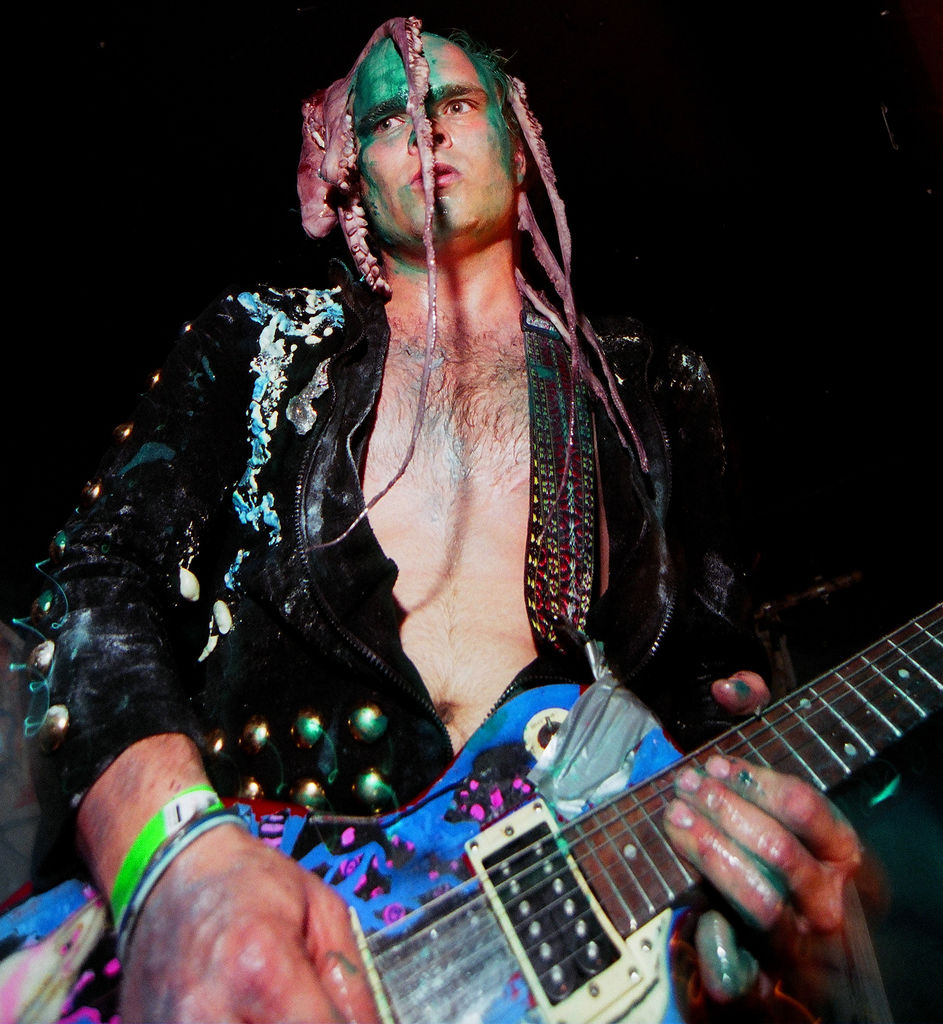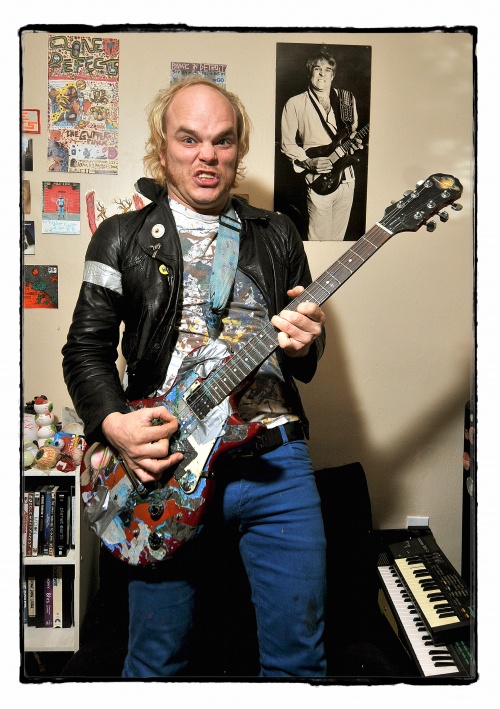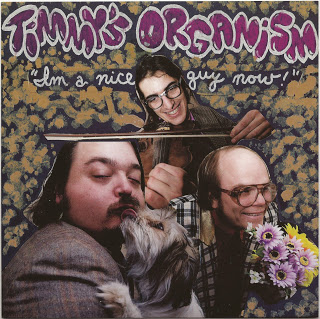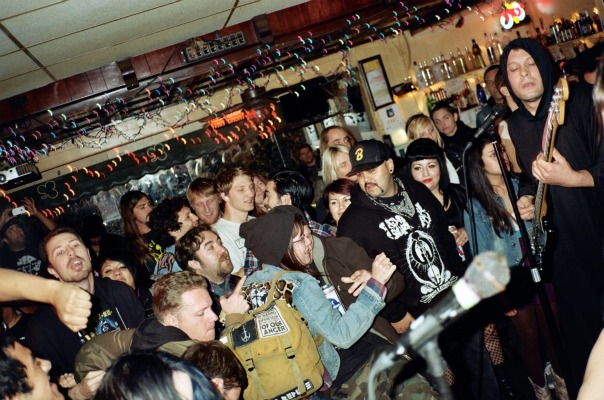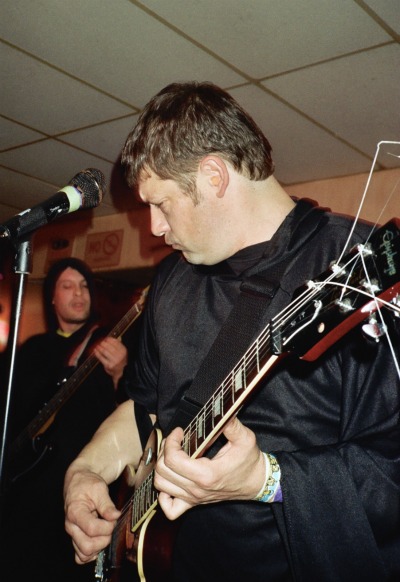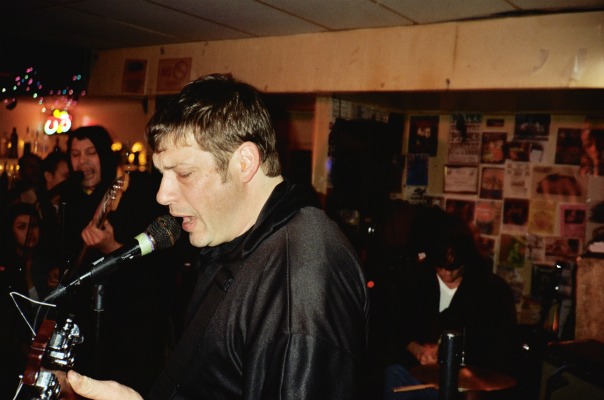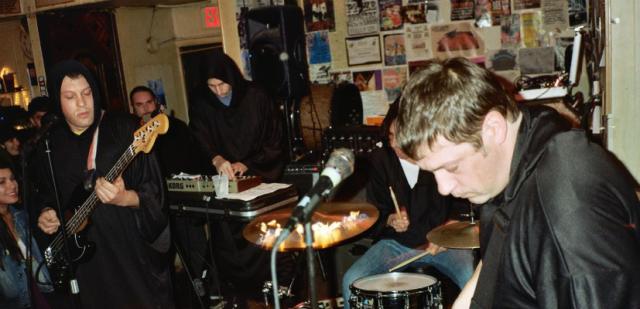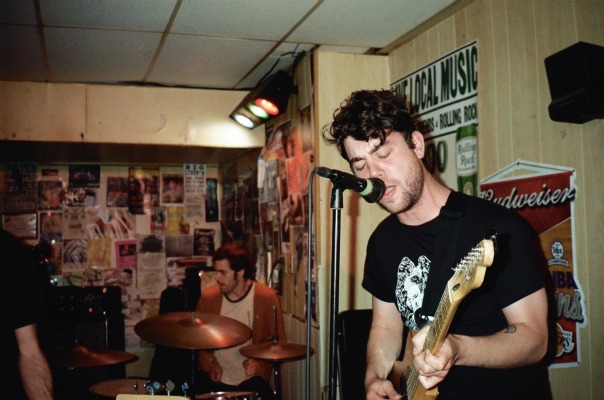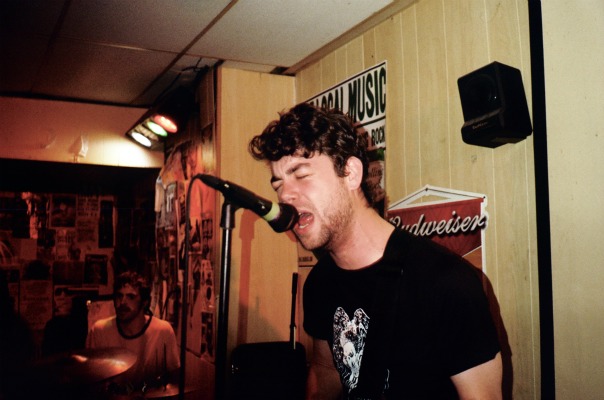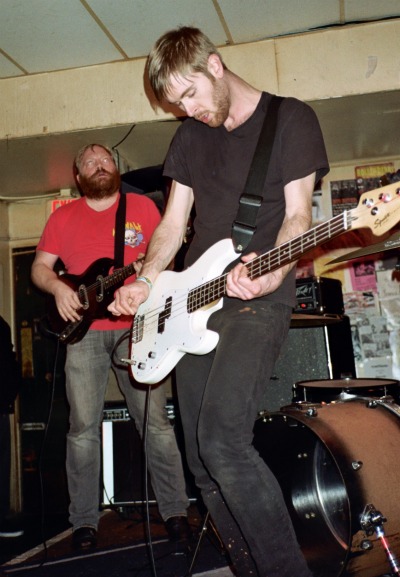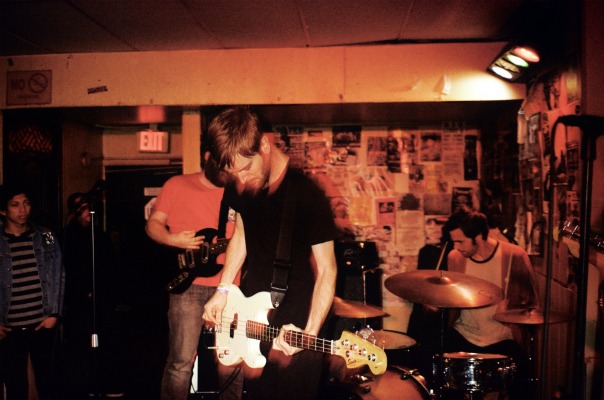Nick Zedd is the founding member—and seemingly the last filmmaker standing—of the Cinema of Transgression. An early ‘80s post-punk, Lower East Side school of filmmaking (Zedd worked with Lydia Lunch and Richard Kern), Cinema of Transgression descended from Jack Smith and John Waters; the movement specialized in anti-academic, confrontational filmmaking experiments. Zedd’s work has now spanned five decades. And he’s still persevering against adversity and indifference—which only seems to make him stronger.
When I interviewed Zedd in 2004, he was collaborating with Rev. Jen on the TV series The Adventures of Electra Elf. The following discussion started at midnight, a week after the presidential election. I found Nick to be very soft-spoken—contrary to his intense and brooding public image—yet when it came to biting social commentary he did not disappoint. His insightful contempt for the ruling class makes Zedd a very likely heir to the vacant throne of William S. Burroughs and other great critics of the American way of life.
Interview by Gib Strange
(Note: This interview first appeared in Strange’s fanzine, Halloween All Year.)
Gib: You’re one of a very small number of filmmakers who have successfully maintained a political edge in filmmaking. When did you become politicized?
Zedd: During the Vietnam War when I read the transcripts of the Chicago Seven trial. I was inspired by Abbie Hoffman and Jerry Rubin. I had an English teacher who denounced William Kunstler (the defense lawyer for the Chicago Seven) who I found to be really inspiring in his honesty in denouncing the fascism of the judge who attempted to muzzle these anti-war activists and make them scapegoats for the police riots that happened in Chicago.
Then seeing with my own eyes the insanity of the Vietnam War radicalized me. Viewing the succession of ruling-class puppets who have ignored the will of the people in this country, be they Democrats or Republicans…realizing that the only real autonomy we can have in our own lives can be found solely in organizing and mobilizing resistance to this evil regime in Washington—which the entire world has now united against. Of course, that’s a positive thing.
Gib: What did your parents do? What were they like?
Zedd: My father is deceased. But he was a lawyer for the US Postal Service and before that the State Department. He was extremely conservative. My mother is also a conservative. She’s a very religious person. So I’ve seen firsthand the fallacies of their belief systems. (laughs)
Gib: When did you start making films?
Zedd: I made short 8mm movies starting at the age of twelve. I continued off and on in high school. The first feature I made was They Eat Scum.
Gib: Did you go to film school?
Zedd: Briefly. I was making movies before I ever went to film school. I went mainly to get access to the equipment.
Gib: How did you come to know Jack Smith?
Zedd: Living in the Lower East Side (of New York), Donna Death, who starred in They Eat Scum, appeared in a film called The Bubble People with Jack Smith. The director (Warren Sonbert) asked me to be in it, too. But I wasn’t into appearing on film at that point. I did go to the set and I met Jack. I would run into him in the East Village and I visited him in his apartment in the early ‘80s. Have you seen his films?
Gib: I’ve seen Flaming Creatures and Normal Love. Was Jack pretty inspirational for you then?
Zedd: Jack Smith was a genius. He maintained his integrity in the face of indifference.
Gib: Two of the greatest chapters in your memoirs (Totem of the Depraved) are the ones dealing with Jack Smith and G.G. Allin. In the case of the latter, you write a very beautiful passage about transcendence in a world of corruption. It occurred to me as I read it that most people who watch your films, and deem them offensive or useless, may be astonished to find that you could be so moving and articulate. As you get older, do you find more acceptance from audiences or do you think this void between people who love your films and people who hate them is just getting larger?
Zedd: It’s hard to tell. I think my movies are now more accessible in that they’re distributed on video and DVD. I may be reaching a wider audience. I have no awareness of their existence although on occasion I do get emails or fan letters. I’m also making new work that people who watch my old films are probably benighted to. I feel like I’m defined, probably inaccurately, by different generations who’ve encountered my work which has evolved and gone through different stages. People who’ve seen my movies in the ‘80s probably have this idea of what I’m doing without having seen the recent stuff. I think that what I’m doing now is just as subversive.
Gib: Your current creation is the Electra Elf TV series.
Zedd: Yeah. Actually this week Manhattan Neighborhood Network is examining the most recent episode that was aired for sexual content and possible obscenities.
Gib: Uh oh!
Zedd: I tried to clean it up. I thought I had censored it enough but apparently you’re not allowed to show a bare nipple. (laughs) Hopefully they’ll give me another chance. I purposely designed The Adventures of Electra Elf to be as G-rated and clean as possible. In this filler episode, “Lord of the Cock Rings,” I cut out the erect penis with the cock ring on it, but I think if something’s on primetime they get more upset. If it had been shown after 11:00 PM they wouldn’t have gotten so upset. But I’m intentionally trying to make it as devoid of genitalia as possible so that I can sneak in the subversive political ideas and social commentary into the comedy.
Gib: At the beginning of your career you were blatantly subversive; now you’re subliminally injecting your message.
Zedd: Right. I think I can reach more people this way. I don’t want to turn off potential audiences with the same kind of shock value I used in the past. I also don’t want to be predictable—just repeating myself forever is something I’m not interested in. But I have found that I’m getting rejected and banned everywhere because I’m not doing what they expect me to. Underground film festivals now don’t want to show my new work.
Gib: (laughs) You’re right back where you started.
Zedd: Right (laughs). I think these film festival people find the new stuff too clean to be underground.
Gib: They’ll catch up eventually. You had some trouble in Sweden, but in general do you find it easier to show your films in Europe? I guess all American audiences are different.
Zedd: Audiences tend to be fine anywhere I show my films. It’s usually governmental organizations that give me trouble.
Gib: Have schools censored you?
Zedd: There’s the censorship of omission. (laughs) It’s hard to get any kind of acceptance from art institutions, although I go through phases of being in fashion and out of fashion. I think it has some connection to the political climate. It seems that when there’s a lot of fear in the atmosphere and repression people get timid, even the art institutions. It’s strange. I showed at MOMA in 1989. Since then, they’ve rejected attempts to screen War Is Menstrual Envy. These places are not at all supportive; they’re largely hostile, which is why I keep going to different places. If I get banned from one place, I’ll just go somewhere else. I’ve been showing films at this one place in New York, Collective Unconscious, since I can’t get shown at Anthology Film Archives anymore…some blockhead took over as manager. Real estate a lot of times dictates the greed of the people running these places. When the rent goes up, they want to foist the cost onto filmmakers. I felt making a TV show and putting it on public access would bring me a bigger audience. Theoretically, it could reach a million people. It’s hard to tell how many people are watching when you’ve got a TV show that doesn’t have Neilson Ratings.
Gib: It feels like in times of war good horror movies come out. Do you think there will be more horror films and political art?
Zedd: A lot of political documentaries came out this year (2004) before the election.
Gib: I can’t believe they didn’t work—sending Bush out of the White House.
Zedd: Well, I think they worked. Kerry did win. It’s just that we’re being led by the media to believe that that was not the case because he prematurely gave a concession speech and they have not counted all the votes still. There are all the provisional ballots from the military that they are now being forced to go kill. Plus there are the Diebold voting machines which were hacked into and possibly gave more votes to Bush.
But about horror: I think that there were great horror movies in the ‘30s and ‘40s as well. And Night of the Living Dead was excellent, of course. There have been a lot of great horror movies since made since then too, like The Exorcist and They Live. I think They Live is relevant now (laughs). I feel like I’m in that movie.
But we just have to keep resisting. There have been tyrannies throughout history and it’s up to us to fight against them.
Gib: A lot of low-budget filmmakers are still reluctant to use video, but you’ve embraced it. Is that purely for financial reasons or have you found a video aesthetic that you like?
Zedd: It’s more immediate. I still like film, but it’s so expensive and my income hasn’t increased at all. Meanwhile the expenses of surviving keep going up. So mini DV is great. I just wish more places had video projection. But that’s why I’ve designed this new series for public access. I was inspired by the Dogme 95 filmmakers—just go out with a camera and shoot.
Gib: You're sort of at the point now in your life where you must be joining people like Kenneth Anger, George Kuchar and others who've been ripped off by commercial filmmakers and music video directors. Have you started to notice anything like that yet?
Zedd: Yeah. I was told there was a Domino’s Pizza commercial that ripped off a scene from Electra Elf. Of course, Natural Born Killers. Oliver Stone directly stole images from War Is Menstrual Envy.
Gib: He didn’t send you a paycheck?
Zedd: (laughs) Uh no.
Gib: Did you ever get the feeling that John Waters’ movie Cecil B. Demented was a jab at you and other filmmakers that took his place in the underground?
Zedd: I guess it was. A lot of people mentioned that to me—that the main character (played by Stephen Dorff) seems based on me. People have mentioned it to John Waters but he always denies it.
Gib: Well what do you think?
Zedd: I think it’s definitely based on me because he took Stephen Dorff to this nightclub where I would show movies every weekend and introduced him to me before they filmed it. One time I asked him if the character was based on anyone in real life and he said, “It was not based on you.”
Gib: Right now you’re directing Electra Elf episodes. You write half an episode, the other half is written by Rev. Jen. How do you feel about directing other people’s stuff?
Zedd: I like it. It’s something I’ve wanted to do for many years. But it’s a whole different mental state when you’re working with someone else’s material. I’ll throw in ideas as we go and if Rev. Jen likes them then we do it. With the episodes that she’s written, it sometimes motivates me to come up with even more inventive fight scenes.
Gib: War is Menstrual Envy, your most expensive film, is truly horrifying—like some kind of post-apocalyptic nightmarish satire of our world. Tell me the film’s origins?
Zedd: I was living on E. 10th Street in the East Village and it was at a time when there had been an uprising in Tompkins Square Park. There was a homeless camp in the park and there was a police riot where the cops went on a rampage after trying to impose a curfew. It got a lot of media attention and the Mayor (of New York) decided to put up a barbed wire fence around the park for a year. I think that contributed to a sense of doom (laughs).
Also at the same time I was following the fall of the Iron Curtain and the transformation of the East Bloc. The people there united and rebelled and had their own anti-Communist revolutions, except Albania which I was fascinated by—that this tiny country would be so isolated. I also went eight months without having sex with anyone and I think that contributed to some sort of self-loathing (laughs).
Then when I met Annie Sprinkle and Ray, the burn victim walking up 6th Avenue, I thought it was some kind of miracle that I ran into them because that resulted in one of the greatest scenes I ever filmed (War Is Menstrual Envy). I felt that at the time he embodied a lot of the pain that was being experienced by victims of war. This all happened around the time of the Gulf War, which I felt was an unjustified and immoral invasion.
The film was a vision of the future. I had very limited resources, but I was showing both beauty and the ugliness at the same time.
Gib: That film is lost?
Zedd: The edited work print was in the trunk of a cab that drove away with it. I still have the original negative, but it’s not edited. I was able to transfer it to 3/4 inch before the work print disappeared, so that is now what is in distribution.
Gib: What happened with the rest of the Transgressives?
Zedd: A lot of them had children or got married or something. That seems to destroy creativity. I don’t know why the other filmmakers haven’t remained as productive. They went into other areas I guess.
Gib: Your autobiography was the most thrilling read I've had since Kinski Uncut. You've written a novel too. What's that about?
Zedd: That was From Entropy to Ecstasy. It’s a historical novel set in Albania. It’s about a psychopathic police lieutenant in the Sigurimi, a collection of sadomasochistic encounters that sort of turn into an adventure novel. I just let my imagination go wild.
Gib: What do you read usually?
Zedd: Well lately I’ve been reading Howard Zinn’s book A People’s History of the United States and also this book The Lucifer Principle, A Scientific Expedition into the Forces of History by Howard Bloom. I like reading autobiographies, like this book on Emile de Antonio. He was a filmmaker I really love. And I like Oscar Wilde, Bukowski, and Nietzsche.
Gib: You did a Nietzsche movie right?
Zedd: Thus Spake Zarathrustra. I was approached by this kid from Maine who came with a hi-8 camera and we shot it on the streets of Williamsburg. We made it look like a silent movie. That was the first movie I shot with Rev. Jen in it and some other strange Goth people. It’s a condensation of some of the book’s ideas updated. I thought it was pretty pure to the vision of Nietzsche.
Gib: Do you have plans to write other books?
Zedd: I have been writing thousands of pages since the mid-nineties. I’ve got a bunch of spiral notebooks. There’s so much there. I hope someday it’ll get published.
Gib: Does it start up where Bleed left off?
Zedd: Yeah, it’s all what’s happened in my life with all the different girlfriends and all the different problems surviving and making movies. There’s enough there for several books. I started typing it into a computer and then one girlfriend had a temper tantrum and smashed the computer with a baseball bat. I still have the original manuscripts.
Gib: Well, don’t lose them.
Zedd: They’re well hidden. I have a lot of valuable stuff that’s in storage too. It’s an enormous financial strain paying the rent every month, but that’s the first thing I pay—the storage where the master tapes are. It’s a constant struggle trying to pay all these bills and shit. Everybody has to do it. I must be some kind of dreamer because I keep thinking it’s worth it to keep shooting in spite of the obstacles. I’m stubborn. I just keep doing it even when the actors act like dicks or whatever. They’re so talented that you have to look past the personal problems. Most actors are really easy to work with. My life is bizarre. I don’t know if anyone else has a life like this.
Gib: What about famous creature feature host Zacherle? What was it like working with him in Geek Maggot Bingo? Did you grow up watching him?
Zedd: No, I just saw pictures of him in Famous Monsters of Filmland magazine. I saw him on TV in New York in the ‘80s—he did some kind of Halloween special. I hadn’t heard about him in a long time so I thought maybe he was going to make a comeback. I contacted him and shot him up at his apartment. He was a pretty funny guy to hang out with. It was just me and him and I was filming him and it was really hard to hold the camera steady because he was making me laugh. He was reading off the script but he sort of embellished some of the lines. He thought up the part where he injects himself in the neck.
Gib: I read that you and I have a favorite film in common—Last Tango in Paris.
Zedd: That’s one of my favorites and it has had a big influence on me. Marlon Brando gave an amazing performance. I love that movie.
Gib: In that movie you feel like you’re seeing a glimpse of something you shouldn’t when you watch Marlon Brando. You don’t know if he’s acting or it’s real.
Zedd: I’m trying to achieve that same kind of effect with the Electra Elf episodes I’m shooting with Rev. Jen. I really try to push her with going to the extremes with her emotions and I think she’s been really great. Sometimes with actors you almost have to torture them to get them to stretch and expand what they’re doing, to go beyond themselves. It’s really important.
Gib: Are there any contemporary filmmakers that interest you?
Zedd: Michael Moore. I went to visit my mother a couple months ago and I asked her, “Have you seen Fahrenheit 911?” And her response was, “Michael Moore is a fucking piece of shit! He’s disgusting.” I couldn’t believe it—my mother never talks like this, and I said, “Have you seen the movie?” and she said, “No, I haven’t.” I replied, “What are you judging him on? You’re judging work you haven’t even seen.” It’s just amazing to me the brainwashing that she got from watching Fox News. I think I’m going to give her a DVD of Fahrenheit 911 for Christmas. It’s the same kind of response she had to the Sex Pistols. It’s amazing to really get under someone’s skin like that when they know nothing about what you’re doing, just somebody trying to tell the truth about something that’s been hidden.
Gib: In 1924 D.W. Griffith was asked what he predicted for the cinema in 2024. Griffith said cinema would "help largely to eliminate all armed conflict in the world." Ironically, right now movies and TV are being blamed for all the violence. Growing up, how much did your parents shelter you from movies and music?
Zedd: They took me to see Last Tango in Paris. I asked them to see Clockwork Orange and Gimme Shelter, so they were actually pretty open minded parents. They drove me to see Alice Cooper when I couldn’t drive. My parents were victims of the propaganda of television. I don’t know why people become Republicans or Christians.
Gib: So do you have any predictions for the future of film? Maybe not 2124; let's stick with Griffith’s 2024.
Zedd: I think that the success of documentaries like Outfoxed and The Corporation—movies shot digitally and distributed and shown in theaters—demonstrates that you don’t have to have a big budget to reach an audience. If the Republicans have their way, they’ll eliminate movie theaters as a way of reaching people. But there’s always the Internet and the availability of DVDs. What really matters is the communication of ideas, telling stories and entertaining people. That’s timeless. That’s going to continue in whatever medium is used. There will always be an underground somewhere, doing something.
Gib: And finally, these are seven questions I got from a book; questions some school children in Germany sent to different public figures including Rainer Werner Fassbinder. Question One: How do you react to negative criticism?
Zedd: With bemused contempt.
Gib: Question two: Do you believe in the existence of extraterrestrial beings?
Zedd: I accept the scientific probability of such.
Gib: Question three: Do you think suicide can be justified on principle?
Zedd: Sure.
Gib: Question four: In time of personal crisis would you consult a psychiatrist/psychologist?
Zedd: If I could afford it.
Gib: Question five: Who is your hero and why?
Zedd: (long pause) Mahatma Gandhi, because he was able to mobilize a nation through nonviolence to eject an imperial power that had used force to exploit and oppress the people of India. He had a genius for inspiring and organizing people. I really admire him.
Gib: Question number six: Do you have any advice for young people?





